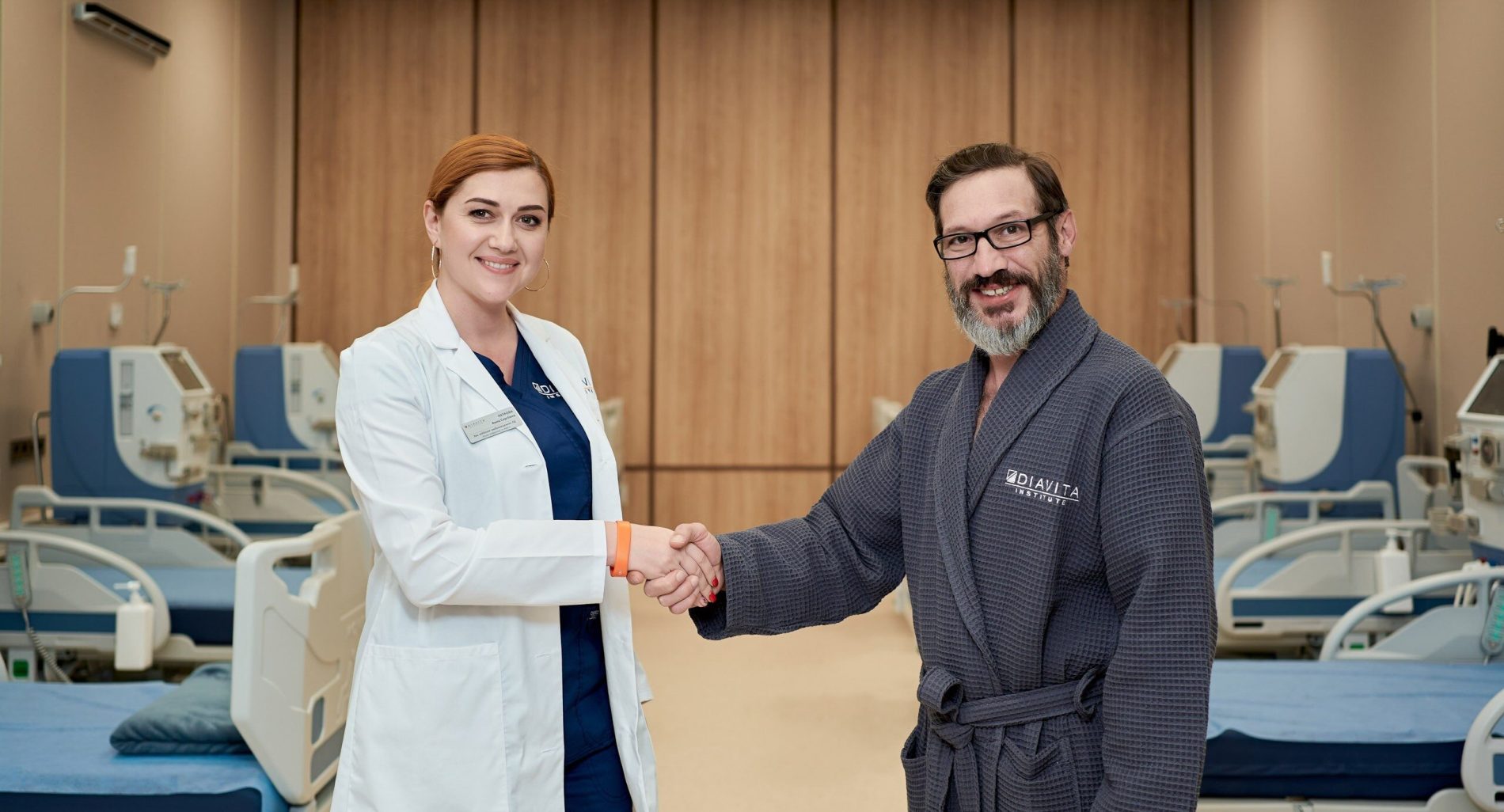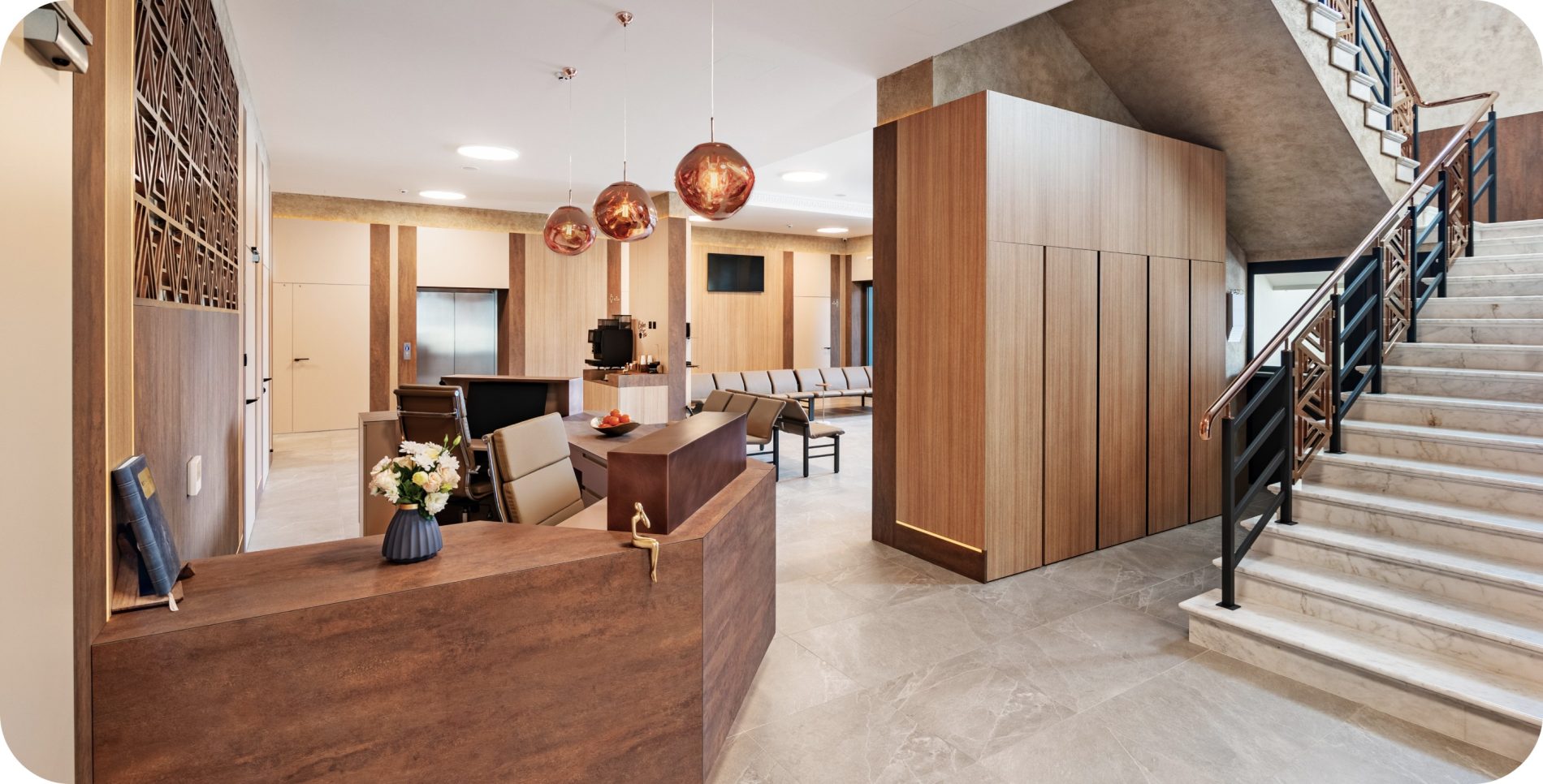
Peritoneal dialysis
Peritoneal dialysis (PD) is a method of dialysis treatmentDiavita Institute Peritoneal Dialysis Expert Center is a comfortable dialysis clinic in Kyiv, where we provide high-quality peritoneal dialysis services for our patients. Peritoneal dialysis is an effective method of choice for dialysis treatment, helping to maintain optimal health when the kidneys lose their function and to conduct dialysis at home.
Peritoneal dialysis offers more flexibility and independence compared to hemodialysis because procedures can be performed at home. It is important to note that the choice between peritoneal dialysis and hemodialysis depends on many factors, including the degree of kidney failure, medical conditions, and individual patient preferences.
The essence of the peritoneal dialysis method is as follows. The dialysis solution prescribed by the doctor is poured into the peritoneal cavity through a catheter. This sterile solution contains special substances that help to effectively absorb toxins and excess substances from the blood within a certain time. After the cleansing period, the solution, along with the removed toxins, is drained from the peritoneal cavity using the same catheter.
This cycle can be repeated throughout the day, usually several times, or only at night during sleep, depending on the specific treatment plan.
At Diavita Institute, we strive to provide a comfortable environment for dialysis therapy. Our friendly and highly qualified team of medical professionals makes every effort to make your treatment as effective and pleasant as possible. We understand that your health is our priority, and we are ready to work together with you on the way to an active and long life.
Continuous ambulatory peritoneal dialysis (CAPD)
Dialysis in usual home conditions, cleaning cycles are carried out during the day. Independence from the power grid.
Automated peritoneal dialysis (APD)
Dialysis in the usual home conditions, cleaning is carried out at night during sleep. A special device is used - a cycler for peritoneal dialysis.
Peritoneal dialysis (PD) is a method of dialysis treatment in which the patient's own peritoneum performs the kidney's function of cleaning the blood from toxins and excess substances.
The peritoneum is a thin serous membrane enriched with blood vessels that lines the walls of the abdominal cavity and envelops the internal organs. The method of peritoneal dialysis is based on the constant removal of harmful substances from the patient's body into the dialysis solution.
Patients who have completely or partially lost kidney function receive peritoneal dialysis.
When a doctor determines that there is a need to start replacement therapy, he takes into account the individual characteristics of each patient, his medical history and other factors when making a decision. It is important not to delay if necessary, but to start dialysis treatment on time - it is proven to improve the quality of life.
Some indicators that may indicate the need to start dialysis:
- Creatinine and urea: Increased levels of creatinine and urea in the blood may indicate kidney failure.
- Azotemia: High levels of nitrogen in the blood, especially in the form of ammonia and urea.
- Hyperkalemia: An increased level of potassium in the blood, which can be dangerous for the cardiovascular system.
- Electrolyte imbalance: Large variations in the levels of electrolytes such as sodium and calcium.
- Symptoms of poisoning: The presence of symptoms such as vomiting, nausea, dizziness, anemia, edema and other signs of kidney damage.
- Decrease in physical activity: If the patient loses the ability to perform daily activities due to kidney failure.
Timely scheduling a consultation with a nephrologist at Diavita Institute will allow you to determine a clear plan of action, optimal approaches and methods of therapy.
To carry out the treatment, a special thin catheter that looks like a flexible tube is implanted in the patient's abdominal cavity in advance. This surgical procedure can be performed both under local and general anesthesia.
A special dialysis solution (prescribed by a doctor) is poured into the peritoneal cavity through a catheter. The solution contains a mixture of electrolytes and glucose and is in the peritoneal cavity for a certain time - the cleaning period. During this time, the solution effectively absorbs toxins and excess substances from the blood through the peritoneum. After the cleaning period, the used dialysate is removed from the peritoneal cavity using the same catheter.
This cycle can be repeated throughout the day, usually several times, or only at night during sleep, depending on the specific treatment plan.
It is important to note that peritoneal dialysis can be performed in an environment convenient for the patient, on an outpatient basis - that is, at home, which provides greater independence and convenience compared to hemodialysis performed in hemodialysis centers.
Of all dialysis methods, peritoneal dialysis (PD) is considered the most physiological for the human body, because the process of cleaning from harmful uremic toxins occurs constantly, similar to the work of healthy kidneys.
Many years of research have demonstrated the superiority of PD as the primary method of renal replacement therapy. It turned out that those patients who started PD treatment after the loss of kidney function had a longer life expectancy compared to patients who were treated with only one method of hemodialysis.
Patients on PD in the first years of treatment have a higher quality of life compared to patients on hemodialysis.
Those who are planning a kidney transplant in the future should take into account that it was the patients who were treated by the PD method that had better results in the functioning of the transplant.
Patients on PD note better health, have the opportunity to be treated at home, do not depend on the dialysis center and save their time. Also, they require less additional drugs compared to patients on hemodialysis.
Automated peritoneal dialysis (APD) is a popular, widespread method of dialysis therapy due to its simplicity, convenience and high quality of life for patients undergoing this treatment.
Unlike regular permanent outpatient dialysis, patients on APD do not need performing peritoneal exchanges (filling and emptying the abdominal cavity) by oneself during the day, being tied to one's home and limiting a socially active life.
APD treatment is carried out using a special device - a cycler (Homechoice Claria from Baxter). The device automatically, without the participation of the patient, ensures the introduction and withdrawal of the dialysis solution from the abdominal cavity. APD treatment, unlike permanent ambulatory peritoneal dialysis, is carried out at night, during sleep and lasts for 9-10 hours, thanks to which the day is freed for the patient's activities, which is a significant advantage of this method of treatment. After waking up in the morning, the patient easily lives his usual life (working, resting, traveling, studying).
With the implementation of the Medical Guarantee Program, patients with chronic kidney disease are treated with peritoneal dialysis in our medical center FREE of charge. You only need to have a valid declaration with your family doctor.
Taking care of the highest comfort of treatment, we provide our patients with high-quality dialysis solutions, which is a prerequisite for effective treatment and good health throughout the day!
All patients of our center receive dialysis solutions from Baxter (Switzerland).
For APD, our patients on a free basis are provided:
- cycler (device for APD) of the latest generation;
- a convenient case for transporting the cycler - you can travel;
- high-quality dialysis solutions of a European manufacturer as prescribed by a doctor;
- timely regular deliveries of necessary dialysis solutions to your place of residence;
- comprehensive medical support during the entire treatment process.
Patients with chronic kidney disease receiving treatment by the method of peritoneal dialysis in Diavita Institute have a high quality of life. We achieve such results thanks to the application of an individual approach to treatment, providing adapted dialysis therapy for each of our patients.
Entrust your health to professionals who treat using the most modern and effective technologies!







